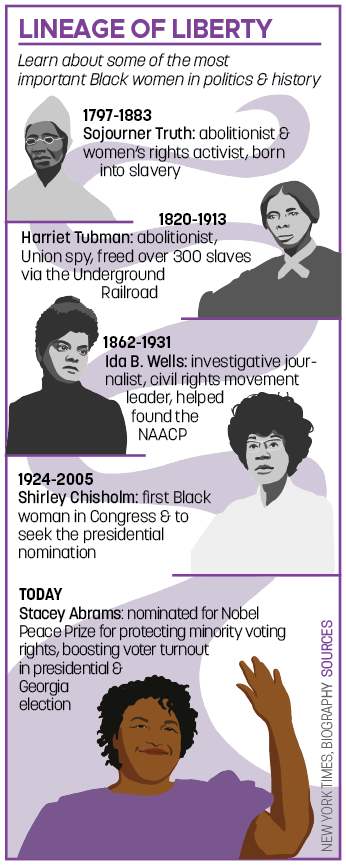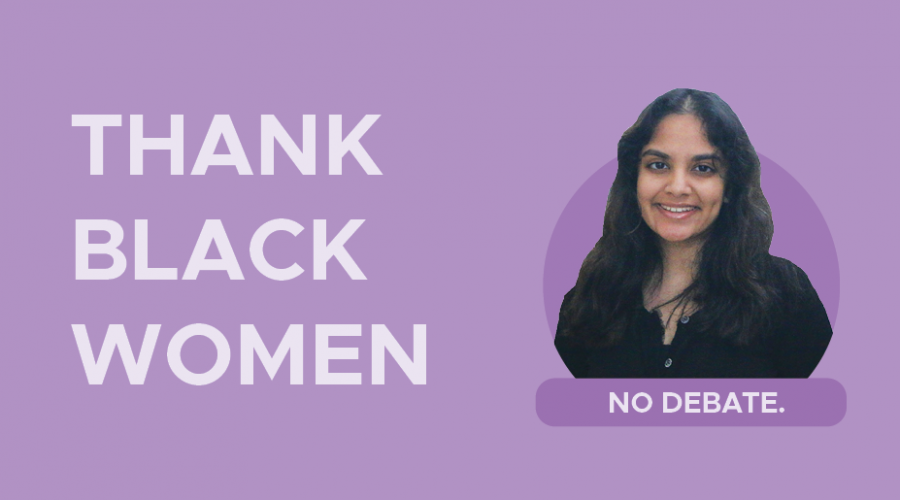Ever since middle school history class, I’ve always been intrigued by our country’s past and the incredible people who paved the way for young girls like me to be more involved in education and activism. However, it became obvious to me that much of our history was taken over by affluent white men, leaving the narratives of minorities and wo men out of the conversation.
men out of the conversation.
It’s easy to name the hundreds of European explorers, white presidents and male scientists who cover pages of our history books. And while these men have made great and undeniable contributions to society, only focusing on them often undermines the major contributions made by Black women.
Last month, my debate partner and I were invited to a prestigious debate tournament that was dedicated to representing female and BIPOC voices in debate. The opportunity allowed for us to learn about the history of Black female representation and how many of their contributions to society have gone unnoticed or have been overshadowed by others.
For example, during the women’s suffrage movement in the early 1900s, many movement leaders like Susan B. Anthony and Elizabeth Cady Stanton took the stage and their efforts were widely showcased. However, black women like Marie Baldwin and Nina Otero-Warren who made just as crucial contributions were pushed to the side and struggled with racism and discrimination from other women. According to Earnestine Jenkins, a professor in Black history at the University of Memphis, “White suffragists aggressively sidelined Black women, using their platforms to perpetuate stereotypes that women of color were uneducated or promiscuous.”
But the discrimination doesn’t stop there. In 1964, Fannie Hamer faced harassment when she and other Black attempted tried to vote. When she fought for minority representation and registered thousands of black voters, the Democratic National Convention still claimed they were for whites only.
At first glance, these may seem like stories of the past; however, Black women face the same obstacles. Despite earning their positions, people still question Stacey Abrams and Kamala Harris of their competence only because of their race and gender.
Here’s the thing: we can’t change how we’ve treated black women and other gender or race minorities in the past. But we can change how we choose to represent and recognize them in the future. It’s important that we push for more representation and change the course of history to thank Black women for all of their contributions to society. Only then can we pave the way for future generations to have their voices heard.
The views in this column do not necessarily reflect the views of the HiLite staff. Reach Sowmya Chundi at schundi@hilite.org
To view more of Sowmya Chundi’s work, click here.

































![What happened to theater etiquette? [opinion]](https://hilite.org/wp-content/uploads/2025/04/Entertainment-Perspective-Cover-1200x471.jpg)













































![Review: “The Immortal Soul Salvage Yard:” A criminally underrated poetry collection [MUSE]](https://hilite.org/wp-content/uploads/2025/03/71cju6TvqmL._AC_UF10001000_QL80_.jpg)
![Review: "Dog Man" is Unapologetically Chaotic [MUSE]](https://hilite.org/wp-content/uploads/2025/03/dogman-1200x700.jpg)
![Review: "Ne Zha 2": The WeChat family reunion I didn’t know I needed [MUSE]](https://hilite.org/wp-content/uploads/2025/03/unnamed-4.png)
![Review in Print: Maripaz Villar brings a delightfully unique style to the world of WEBTOON [MUSE]](https://hilite.org/wp-content/uploads/2023/12/maripazcover-1200x960.jpg)
![Review: “The Sword of Kaigen” is a masterpiece [MUSE]](https://hilite.org/wp-content/uploads/2023/11/Screenshot-2023-11-26-201051.png)
![Review: Gateron Oil Kings, great linear switches, okay price [MUSE]](https://hilite.org/wp-content/uploads/2023/11/Screenshot-2023-11-26-200553.png)
![Review: “A Haunting in Venice” is a significant improvement from other Agatha Christie adaptations [MUSE]](https://hilite.org/wp-content/uploads/2023/11/e7ee2938a6d422669771bce6d8088521.jpg)
![Review: A Thanksgiving story from elementary school, still just as interesting [MUSE]](https://hilite.org/wp-content/uploads/2023/11/Screenshot-2023-11-26-195514-987x1200.png)
![Review: "When I Fly Towards You", cute, uplifting youth drama [MUSE]](https://hilite.org/wp-content/uploads/2023/09/When-I-Fly-Towards-You-Chinese-drama.png)
![Postcards from Muse: Hawaii Travel Diary [MUSE]](https://hilite.org/wp-content/uploads/2023/09/My-project-1-1200x1200.jpg)
![Review: "Ladybug & Cat Noir: The Movie," departure from original show [MUSE]](https://hilite.org/wp-content/uploads/2023/09/Ladybug__Cat_Noir_-_The_Movie_poster.jpg)
![Review in Print: "Hidden Love" is the cute, uplifting drama everyone needs [MUSE]](https://hilite.org/wp-content/uploads/2023/09/hiddenlovecover-e1693597208225-1030x1200.png)
![Review in Print: "Heartstopper" is the heartwarming queer romance we all need [MUSE]](https://hilite.org/wp-content/uploads/2023/08/museheartstoppercover-1200x654.png)




Remi Shirayanagi • Feb 22, 2021 at 10:06 pm
Excellent article sowmya!